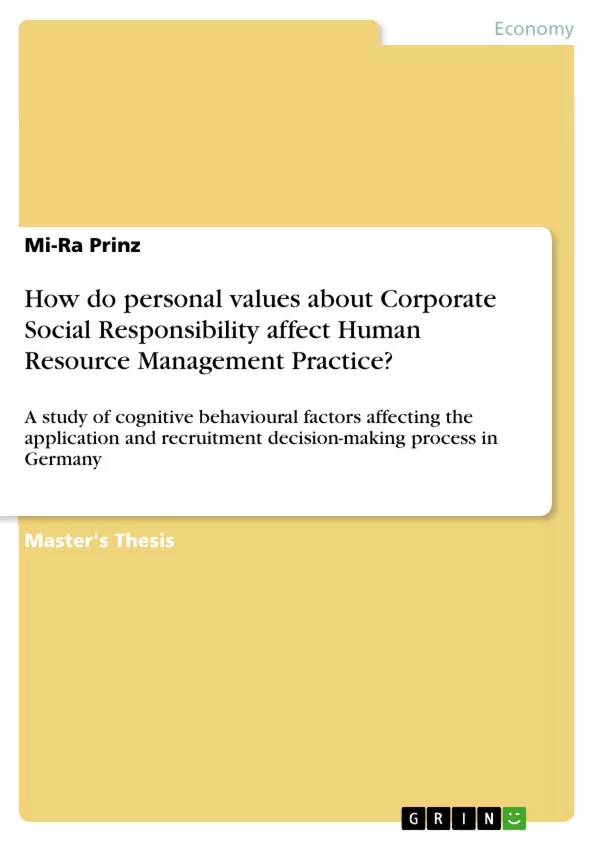Abstract
Little research has been conducted into corporate social responsibility and its implications for
human resource management, in particular with regard to application and recruiting process. The
study recognizes the importance of CSR in current management practice and strategy and examines
the way in which personal values regarding CSR affect application and recruitment practices in
Germany. To this end the study explores how individuals understand and define CSR and asks
which factors influence this. Moreover, the findings show what role individual understandings of
CSR play in the application and recruiting process. The research seeks to understand the external
environment that decisions are taken within and thus highlights the impact of socio-economic
context on personal values regarding CSR in general and in specific regarding the first point of
contact between job applicant and targeted company. The theoretical lens applied makes use of
Carroll‟s (1991) pyramid of CSR and Festinger‟s (1962) theory of cognitive dissonance. The study
is qualitative and includes an analysis of 16 semi-structured interviews with business students and
HR-managers working in companies in Germany. The results are used to present a complex and
multifaceted model that reflects the variety of factors that should be taken into consideration during
the application and recruiting process.
Inhaltsverzeichnis (Table of Contents)
- 1. Introduction
- 2. CSR and its impact on recruitment – A literature review
- 3. Methodological approach
- 3.1 Design and Procedure
- 3.2 Reflexivity
- 3.3 Participants
- 3.4 Ethical considerations
- 3.5 The context of research: Germany
- 4. Findings/ observations and analysis
- 4.1 How do individuals understand and define CSR?
- 4.2 What factors influence these understandings of CSR?
- 4.3 What role do individual understandings of CSR play in the application and recruiting process?
- 5. Discussion
- 6. Conclusion
- 6.1 Research design limitations
- 6.2 Recommendations for further research
Zielsetzung und Themenschwerpunkte (Objectives and Key Themes)
This study examines the impact of personal values regarding Corporate Social Responsibility (CSR) on human resource management (HRM) practice, particularly in the context of application and recruitment processes in Germany. It explores how individuals understand and define CSR, the factors influencing these understandings, and the role these understandings play in hiring decisions. The research aims to provide a nuanced understanding of the external environment within which HRM decisions are made, highlighting the influence of socio-economic context on personal values regarding CSR.
- The relationship between personal values on CSR and HRM practice, particularly in recruitment and application processes.
- The factors influencing individual understandings of CSR and how these understandings are shaped by socio-economic context.
- The role of individual understandings of CSR in the application and recruiting process, and how these influence hiring decisions.
- The application of Carroll's pyramid of CSR and Festinger's theory of cognitive dissonance to understand the relationship between CSR and HRM practice.
- The impact of the German socio-economic context on personal values regarding CSR and its implications for HRM.
Zusammenfassung der Kapitel (Chapter Summaries)
The study begins with an introduction that outlines the research problem and its significance. Chapter 2 presents a comprehensive review of the literature on CSR and its impact on recruitment, providing a theoretical framework for the study. Chapter 3 describes the methodological approach, including the research design, data collection methods, and ethical considerations. The findings and analysis are presented in Chapter 4, exploring how individuals understand and define CSR, the factors influencing these understandings, and the role they play in the application and recruiting process. Chapter 5 discusses the findings in detail, drawing connections between the theoretical framework and empirical data. Finally, Chapter 6 provides a conclusion, summarizing the study's key findings, limitations, and recommendations for future research.
Schlüsselwörter (Keywords)
The research focuses on the intersection of Corporate Social Responsibility (CSR), Human Resource Management (HRM), recruitment, application processes, personal values, cognitive behavioral factors, and socio-economic context, specifically within the German context. The study employs theoretical frameworks such as Carroll's pyramid of CSR and Festinger's theory of cognitive dissonance to analyze the relationship between individual understandings of CSR and decision-making processes in HRM.
Frequently Asked Questions
How do personal values about CSR affect the recruitment process?
Personal values influence how job seekers perceive a company and how HR managers evaluate candidates, potentially leading to better alignment between the individual and the corporate culture.
What theoretical frameworks are used to analyze CSR in HRM?
The study utilizes Carroll’s (1991) pyramid of CSR and Festinger’s (1962) theory of cognitive dissonance to understand decision-making and value alignment.
How is CSR defined by individuals in the German business context?
Definitions vary widely but are often shaped by the specific socio-economic context of Germany, including legal requirements and social expectations of corporate behavior.
What role does cognitive dissonance play in the application process?
Applicants may experience cognitive dissonance if their personal values regarding social responsibility conflict with the perceived actions or reputation of a targeted company.
Why is the first point of contact between applicant and company important for CSR?
It is the moment where the company's CSR image is tested against the applicant's expectations, significantly influencing the decision to proceed with the application.
- Quote paper
- Mi-Ra Prinz (Author), 2011, How do personal values about Corporate Social Responsibility affect Human Resource Management Practice?, Munich, GRIN Verlag, https://www.grin.com/document/271191



